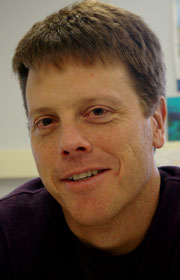Determining both the causes and the effects of climate change can be tricky business for a scientist, but there’s little doubt in the mind of Arctic researcher Aaron Fisk about whether it’s happening. Climate change is dramatic,  it’s real and at this point it may be irreversible, he believes.
it’s real and at this point it may be irreversible, he believes.
“I’ve seen the changes in the Arctic and we understand the mechanisms that cause it, so I’m really concerned,” said Dr. Fisk, who just returned from one of his numerous field trips to Pangnirtung, a remote Inuit community in the Cumberland Sound area of Baffin Island.
A professor in the university’s Great Lakes Institute for Environmental Research, Fisk studies trophic ecology, or the interactions between species in ecosystems and how nutrients and pollutants move through those food webs. He’s currently responsible for the Arctic portion of the Ocean Tracking Network, a massive global initiative to record the migratory patterns of vast numbers of aquatic species around the planet.
Thanks to the explosion of new technology, understanding those patterns has become much better, said Fisk, who will appear on CJAM 99.1 FM today to discuss his research. Members of his team have travelled regularly to Cumberland Sound in recent years to catch various fish and marine mammals and attach satellite tags and surgically implant acoustic tags in them to better record their movements. They also collect tissue and blood samples to look for “chemical tracers” – elements like mercury, carbon and nitrogen, or pollutants like PCBs – which provide important insights about what those animals have been feeding on.
And while he’s happy the data he’s collected will provide useful information for conserving fish stocks and managing new fisheries Inuit communities are relying on for economic development, he’s concerned about the dramatic changes he’s seen to Arctic sea ice. Since he started going there in 1998, the ice in Cumberland Sound has receded by almost 20-30 kilometers.
Despite the mild winter we experienced here, Fisk said it was colder than usual in the Arctic and Inuit fisherman were excited about the sea ice and the increased mobility for hunting and fishing it provided them. And although  temperatures were colder than they’ve been in recent memory, they were still higher than average over the last 80 years, which had detrimental effects on the sea ice.
temperatures were colder than they’ve been in recent memory, they were still higher than average over the last 80 years, which had detrimental effects on the sea ice.
“It’s not just the lack of ice, but how quickly it’s starting to break up and melt,” he said. “Despite the cold winter, it’s melting sooner and it’s melting very rapidly.”
Fisk will appear today on Research Matters, a weekly talk show that highlights the work of University of Windsor researchers and airs at 4:30 p.m. every Thursday on CJAM.

